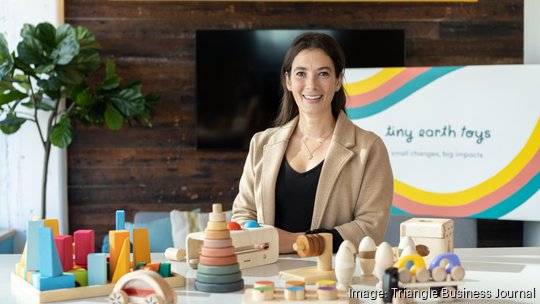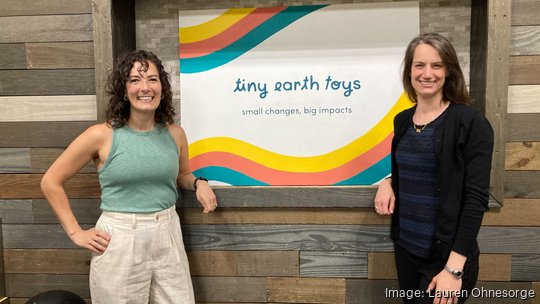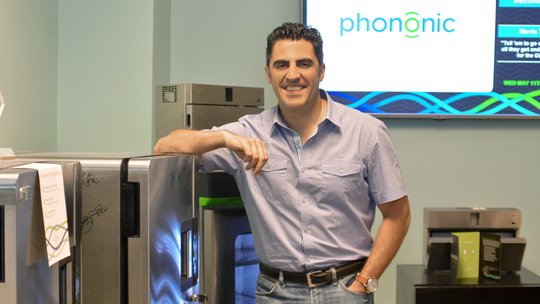
Sometimes to get your idea across the finish line, it takes crumbling up the original plan and putting the marker to the whiteboard.
It's a humbling experience, says Rachael Classi, CEO of Tiny Earth Toys. When she founded her startup, it was billed as a toy subscription operation, a way to help save parents from mounds of plastic toys.
Today it's completely turned face, selling toys instead of renting them and working on prototypes of a new combination dollhouse-bookshelf.
The mission is still there: Sustainable toys that won't clutter your house (or the landfill). But the startup, it looks quite different. And Tiny Earth Toys in Durham is just one example.
Triangle Inno spoke with three innovators about making the pivot and what advice they have for entrepreneurs looking to keep up with the market.
Tiny Earth Toys
Classi, who recently returned from Asia to look at prototypes, said the company is in the process of designing and manufacturing a product that will “reimagine the dollhouse experience,” a pivot that came after months of research.
“It’s how can we offer circularity, but also offer profitability,” Classi said. “We know the problem we wanted to solve. The problem is plastic toy waste and this endless cycle of low quality products coming into the home.”

She says shifting from toy rentals was a “bittersweet” experience that required hard conversations, made easier by the focus on the mission.
“We have this mantra that we’re going to build a dollhouse that, within a single home, will be used and on display for decades and then can be used and passed down for generations … but also make them modular,” she said.
An advisor told her “the most important thing is, you get the memo and you get the memo early. And I feel like we got the memo.”
Classi advises entrepreneurs to take a hard look at their mission and the multiple ways it can happen.
You have to be realistic about funding, she said. “No money, no mission. We can’t work on our mission unless we are profitable.”
RevBoss
Eric Boggs, CEO of RevBoss, said that, like many entrepreneurs, he started his company with “a vision in your head for how you want things to work out.”
“When it becomes very clear that it isn’t working out the way that you want, it doesn’t feel very good, and that can make it very hard to see the right decision,” he said. “The right decision is usually a pretty painful one to make.”
Boggs said RevBoss had a choice. It could raise more capital “on painful terms,” wind down its business, or “do what we did, which was make it work.”
It was 2018 and the team had built a user-driven product on a big vision. Except RevBoss was struggling to secure SaaS customers. Instead, clients were asking about specific problems.
“We said, yeah, we could do that, how about $2,000 a month,” Boggs recalls. “We had a hard time getting SaaS customers, but we got service customers. … Maybe we should do this.”
The decision changed the trajectory of the business, which not only survived, but grew to about 50 people.
Today, RevBoss is a B2B sales prospecting service provider with hundreds of clients, driving the leads so they can close deals.
“Just get profitable, whatever it takes,” Boggs said about his advice for entrepreneurs. “That’s effectively what we did, we got to a point where we were able to control our own destiny.”
Phononic
Tony Atti, CEO of Durham-based Phononic, said it took six months of “flying around the world,” meeting with customers, to make a change.
Phononic, which has raised more than $210 million, develops refrigeration technologies, first intended for places where precision counts, like medical laboratories. Phononic considers itself a technology firm, not an appliance company.
But things could have been very different, had Atti and team not made a big pivot.

The company made a deliberate decision over the past two years, transitioning from just hardware sales into a solutions platform that can offer customers real insights, and can even be licensed across multiple sectors, from e-commerce delivery to firms working in LiDAR sensors used in electric vehicles.
The shift is resulting in solid customers across multiple industries, like ShopRite, which recently teamed up with Phononic on freezer and refrigerator totes so it could pick, store and stage online grocery orders efficiently.
Importantly for Phononic, it’s more recurring revenue than just selling cooling units.
As Atti told a crowd at Raleigh-Durham Startup Week this month, it’s not a pivot he entirely saw coming a few years ago.
Just 18 months ago, the firm had been considering an initial public offering through a SPAC deal. And investor feedback came with the process.
Atti said a backer he trusts put things into perspective, saying, “When you look at the forecast for your company, you speak to recurring revenue, you speak to licensing … but it’s not until many years from now.”
“If you were to have gone public, we valued you like an appliance company, not a technology company,” Atti recalls the investor saying, adding that it “forced me to step back and canvas our go to market strategy.”
He turned to his customers, asking candid questions about what they were looking for, and it wasn’t new refrigeration features in Phononic’s hardware — it was data access.
His advice? “Get out there and talk to customers.”